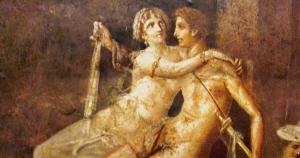 Of all the great things one can learn from Virgil’s Aeneid, and a great man like Dante could learn so much from Virgil that he could create a language and a cosmos from the inspiration, there is a small thing I learned, even as a person who does not know the beauty of the Latin and is no expert, by participating in a discussion listening to those who do know more.
Of all the great things one can learn from Virgil’s Aeneid, and a great man like Dante could learn so much from Virgil that he could create a language and a cosmos from the inspiration, there is a small thing I learned, even as a person who does not know the beauty of the Latin and is no expert, by participating in a discussion listening to those who do know more.
The Aeneid shows that there is more to life than meeting personal needs.
A man can come to a place where all his skills are used, his ambitions answered, wholly in love, and not be at home. There are many ways to read the relationship of Aeneas and Dido. Heroic he is an exile from burning Troy who is tasked by Jupiter to build great Rome and she is the heart hurt Queen of mighty Carthage, someday to be the mortal enemy of Rome. She has a city and needs a strong arm to keep it safe from neighbors and her own warring brother. He is a man much in need of a city, a wife, and a mother for his son.
Some of the gods see their relationship as a solution to their problems, others as a way to cause havoc for Aeneas. Dido and Aeneas do not just fall in love, they drop headlong into a supreme passion. She neglects her rule at first, but he begins to help her turning the skills that should lay the foundations for Rome to the benefit of Carthage. Of course Jupiter puts a stop to all of these “shenanigans” to quote a college student. Aeneas has to leave and Dido is left desolate. In the past, I have read his “regrets” to Dido as insincere, but this time realized the situation is more complicated.
They both love the way things are. In Book IV Aeneas says:
“I never shall deny what you deserve, the kindnesses 450 that you could tell; I never shall regret remembering Elissa for as long as I remember my own self, as long as breath is king over these limbs. I’ll speak brief words that fit the case. I never hoped 455 to hide—do not imagine that—my flight; I am not furtive. I have never held the wedding torches as a husband; I have never entered into such agreements. If fate had granted me to guide my life 460 by my own auspices and to unravel my troubles with unhampered will, then I should cherish first the town of Troy, the sweet remains of my own people and the tall rooftops of Priam would remain, my hand 465 would plant again a second Pergamus for my defeated men.*
He is not getting what he wants and to prove it says that Troy is what he wants, but Troy is gone. This is surely sincere, so I have come to think that everything Aeneas says may be heartfelt as well. He wishes he could stay. He is tired of the journey. He cares for Dido, but he cannot stay.
It is not just that there is a greater good, but that so many other individuals (including his son) depend on his actions. The “greater good” matters, but can be an abstraction that also justifies harm to people (like Dido). Aeneas realizes that his own perfect happiness ended the day Troy fell, that making everyone he cares about perfectly happy also is impossible, and so does the best he can.
This is hard, but it is very real.
As a great writer, Virgil does give Aeneas mixed motives. He probably is insincere when he talks to Dido, but there is no reason to flatten out his character and see him as totally so. Dido herself has agency and so turning her into a cartoon character without power does injustice to her real character.
Both should act for the good of their cities, but only Aeneas does so. Dido does not and for this Virgil at least finds her tragic, but blameworthy.
———————————-
*Virgil, The Aeneid (translation by Allen Mandelbaum)
















